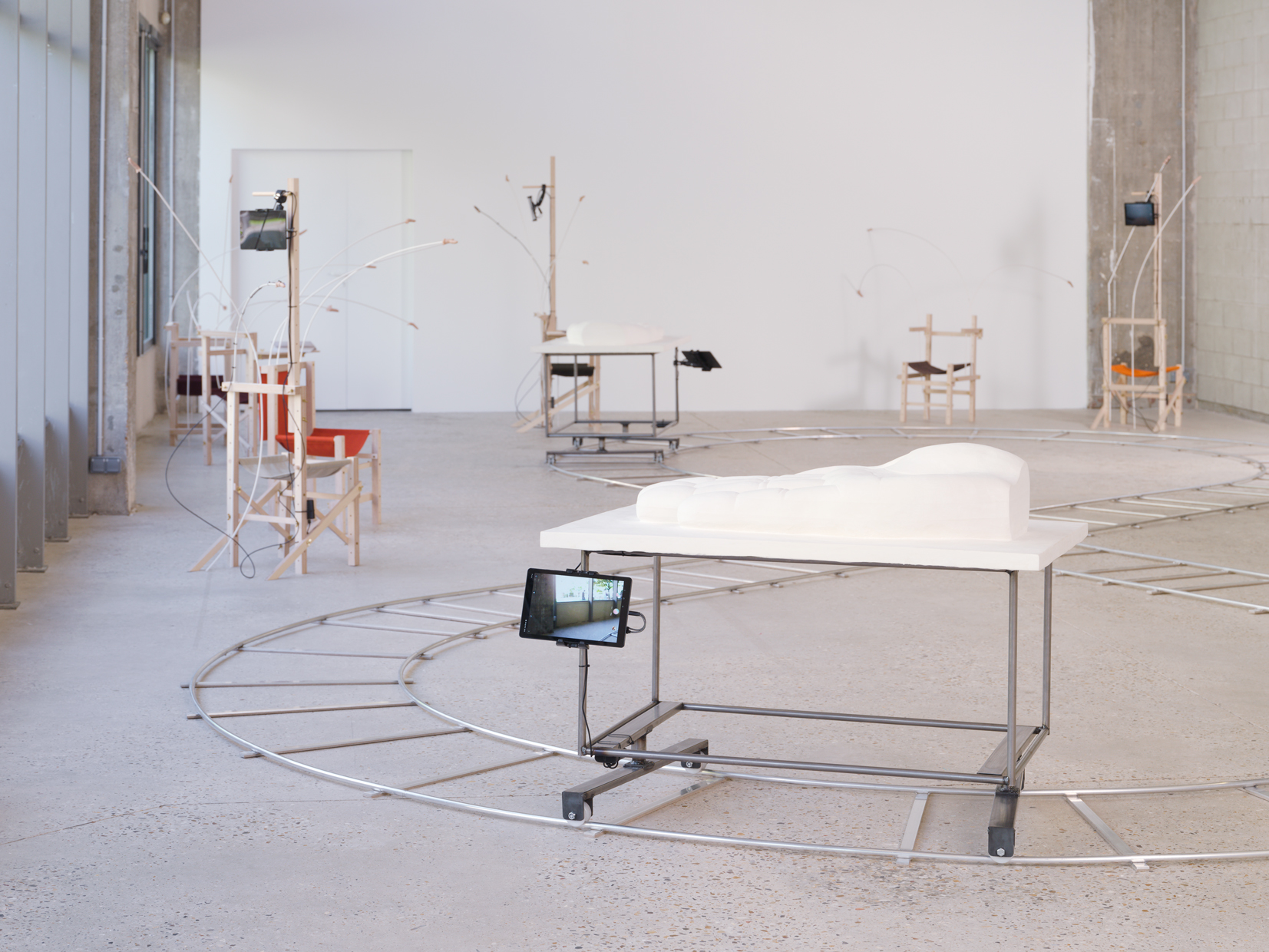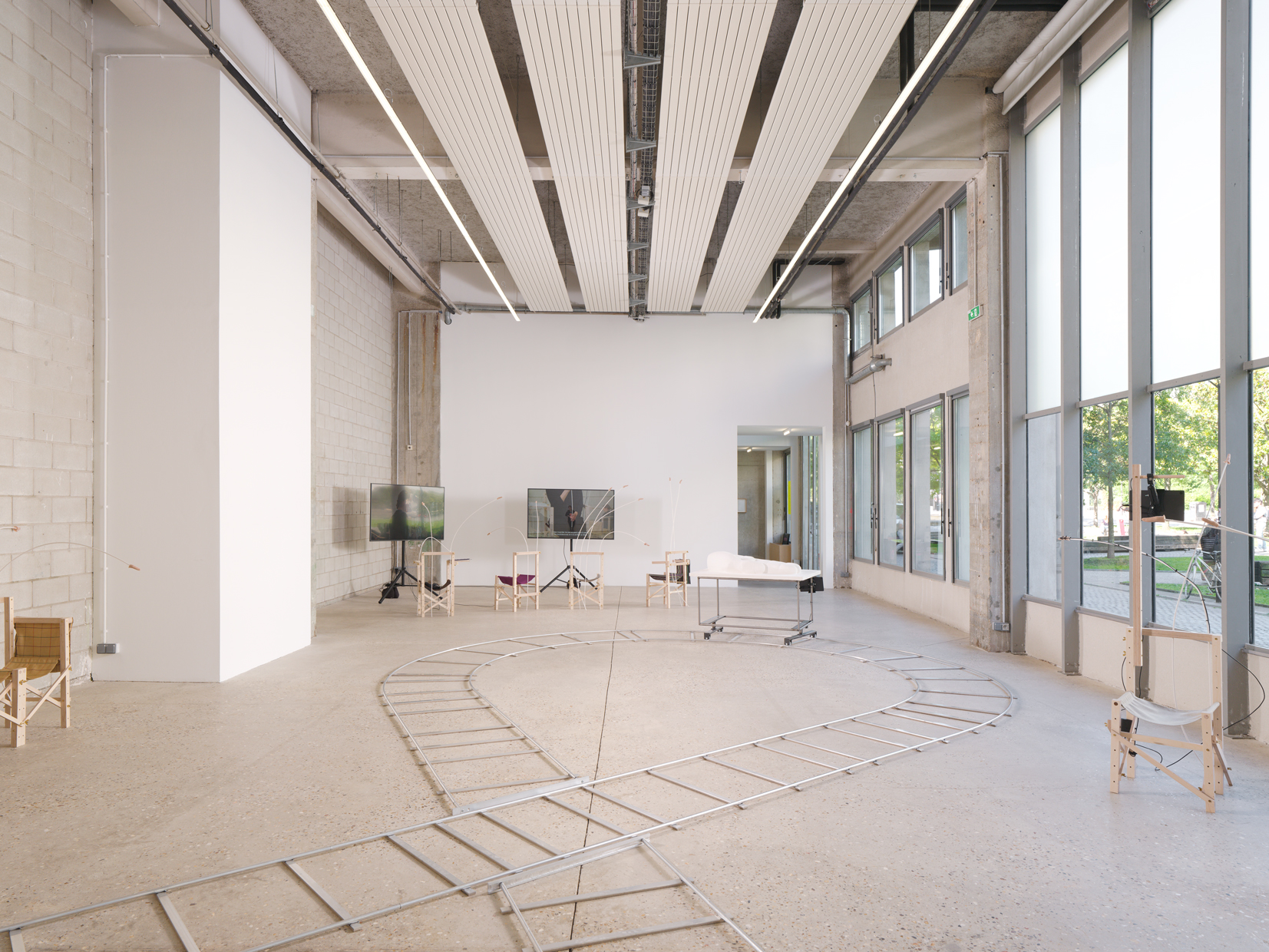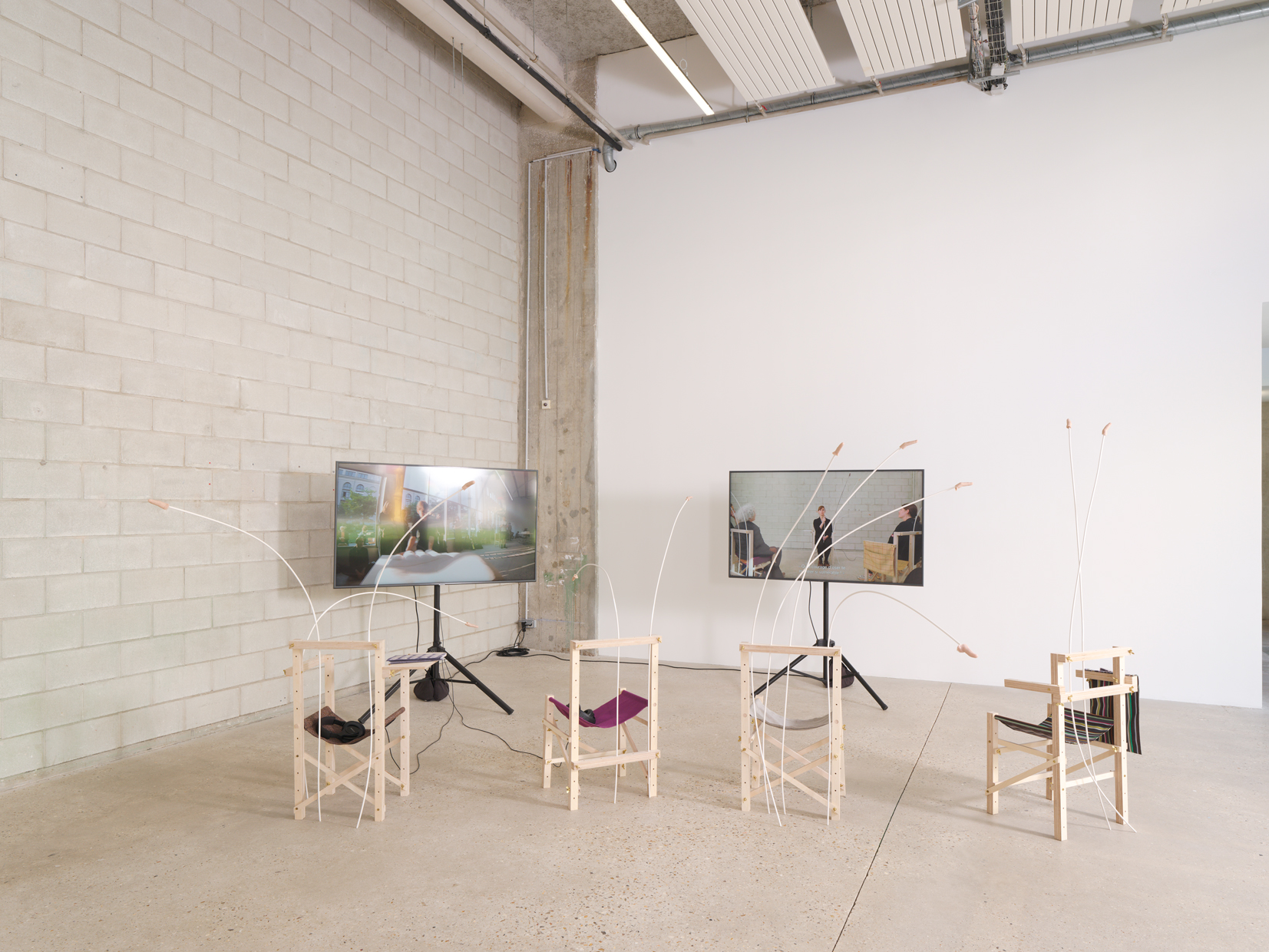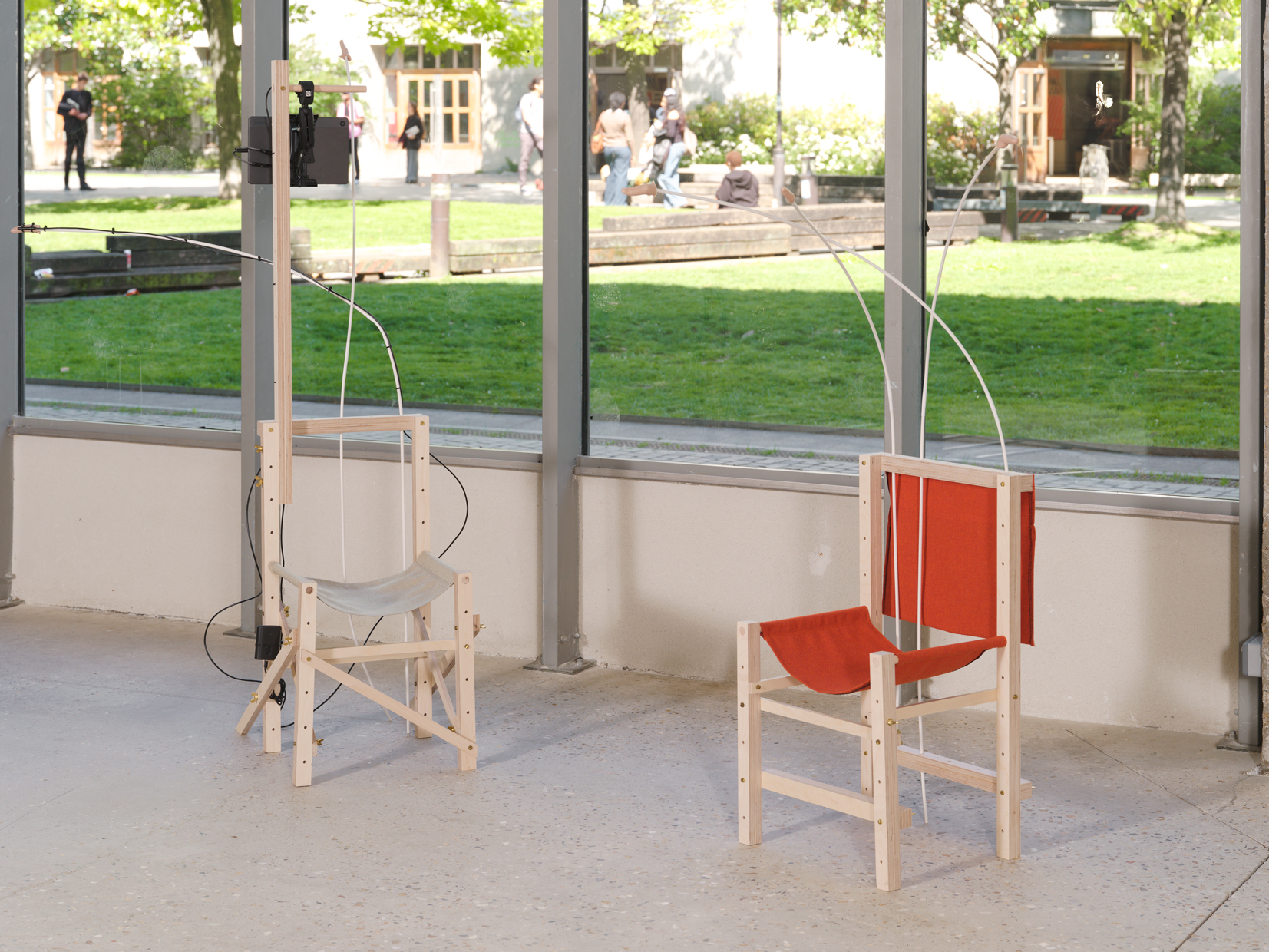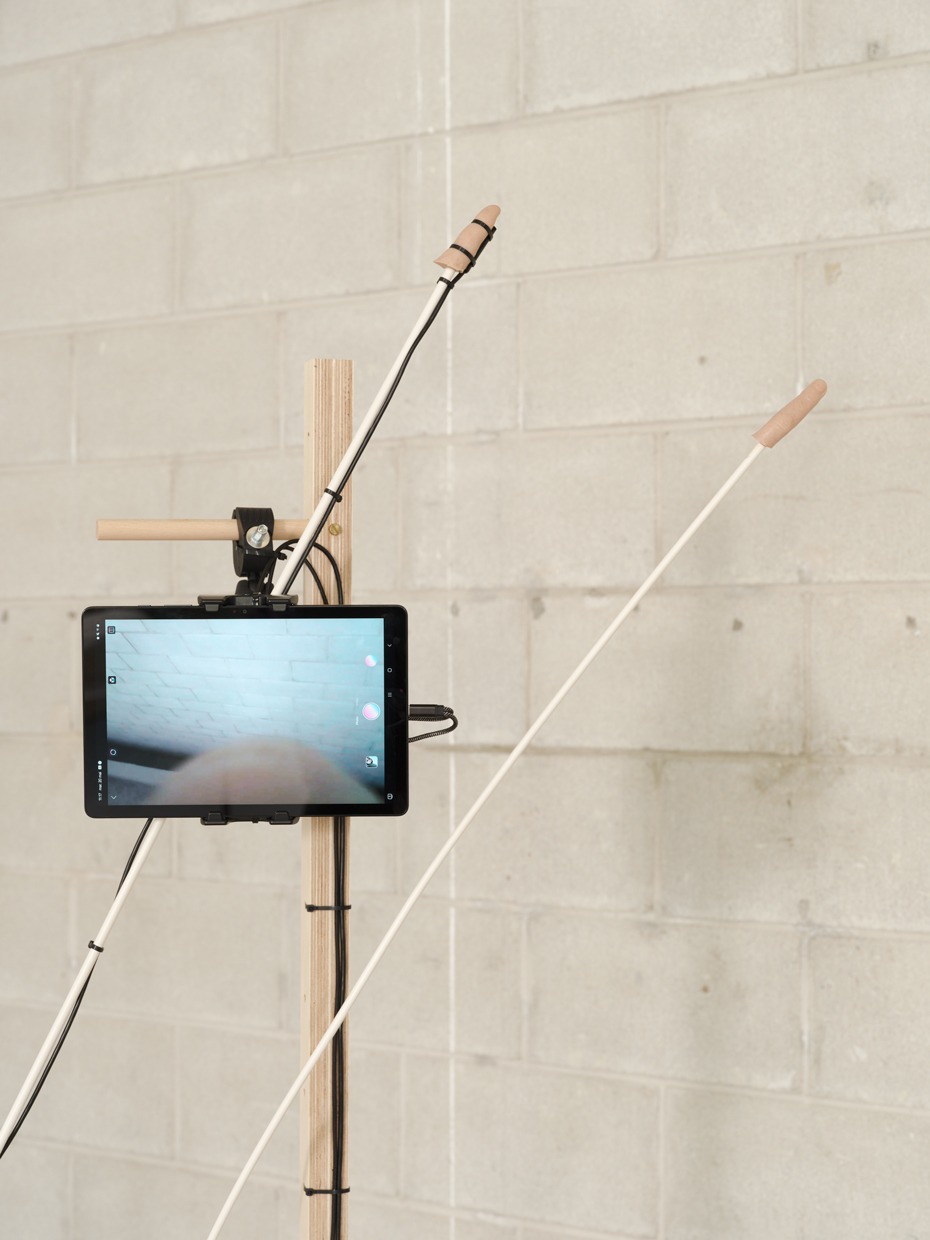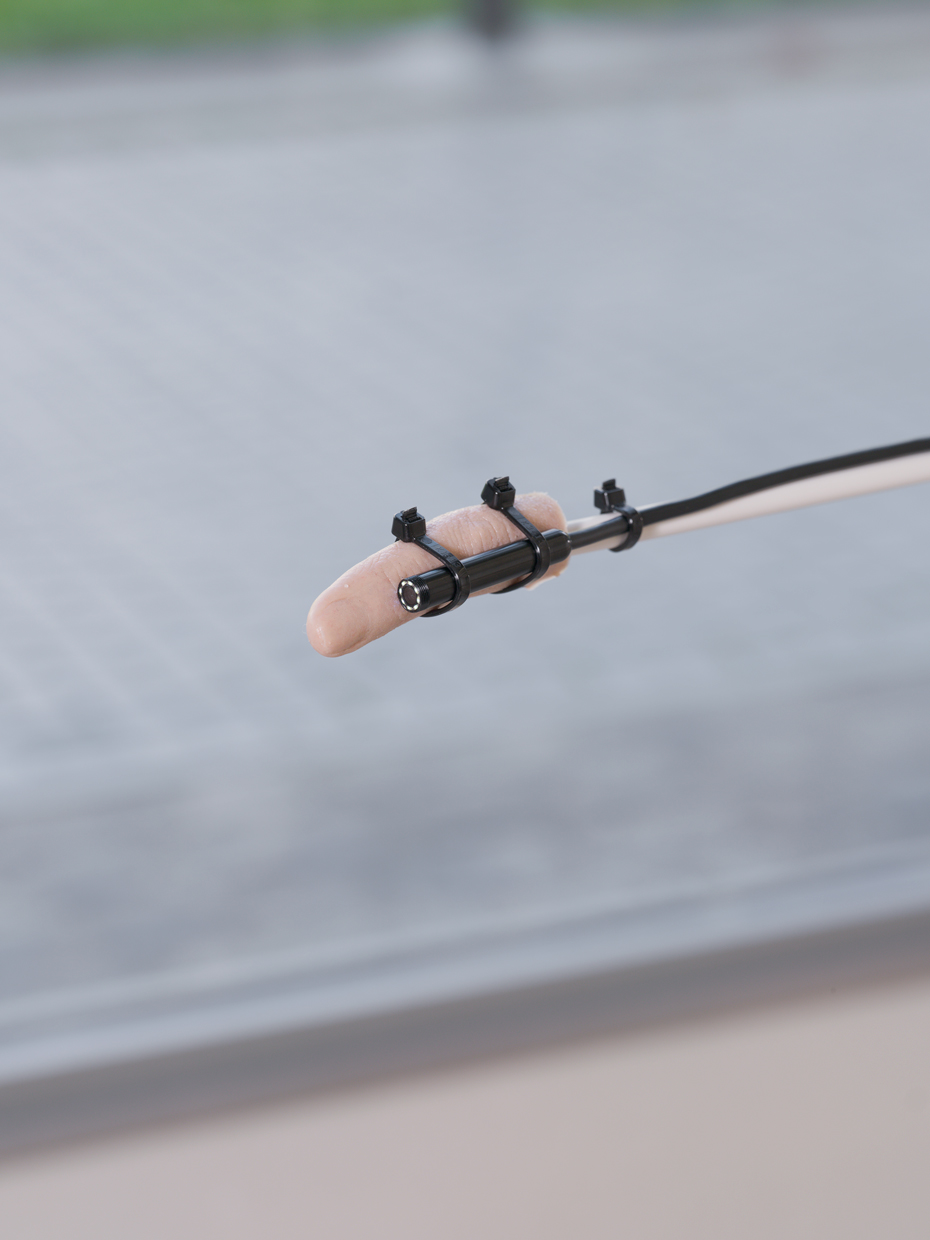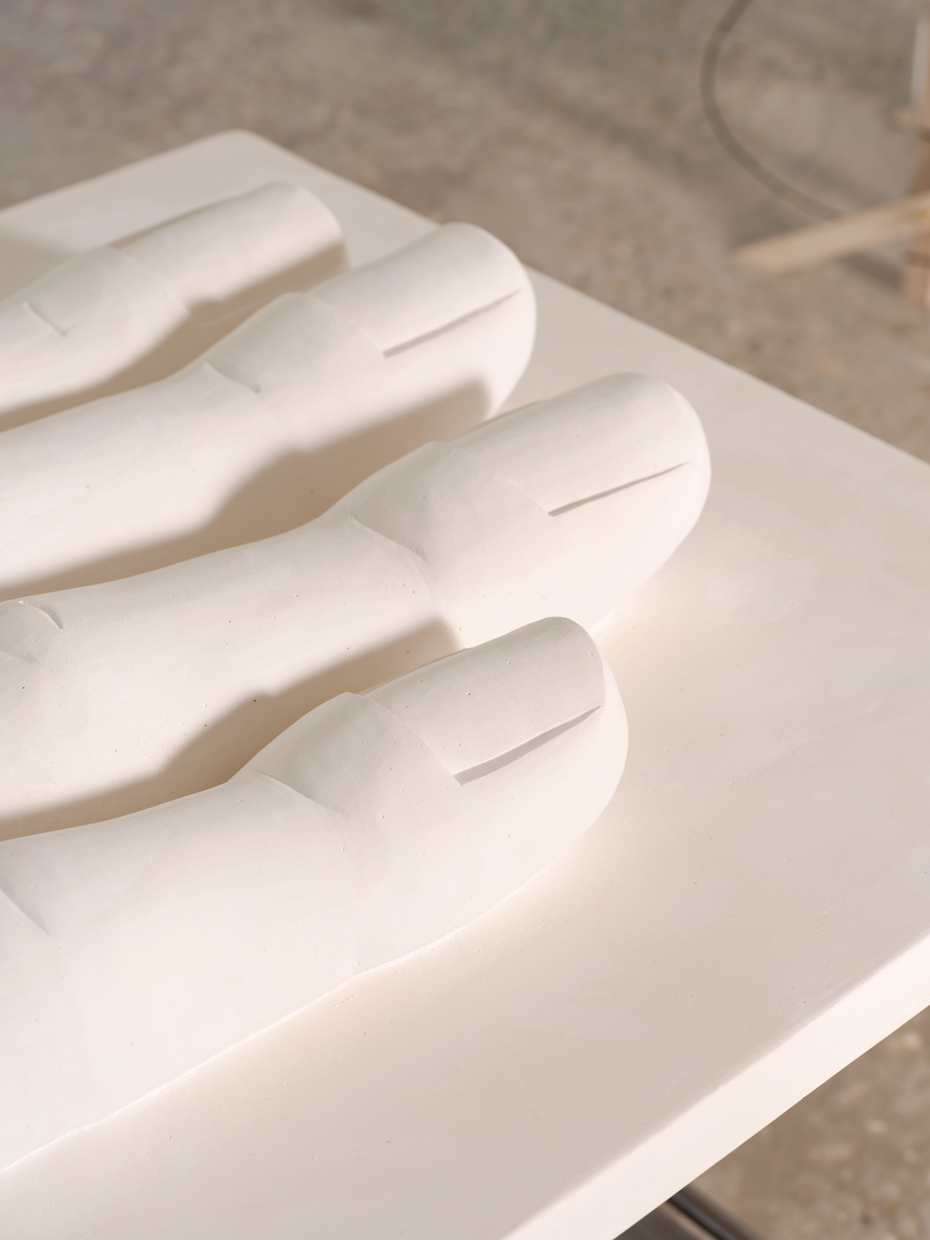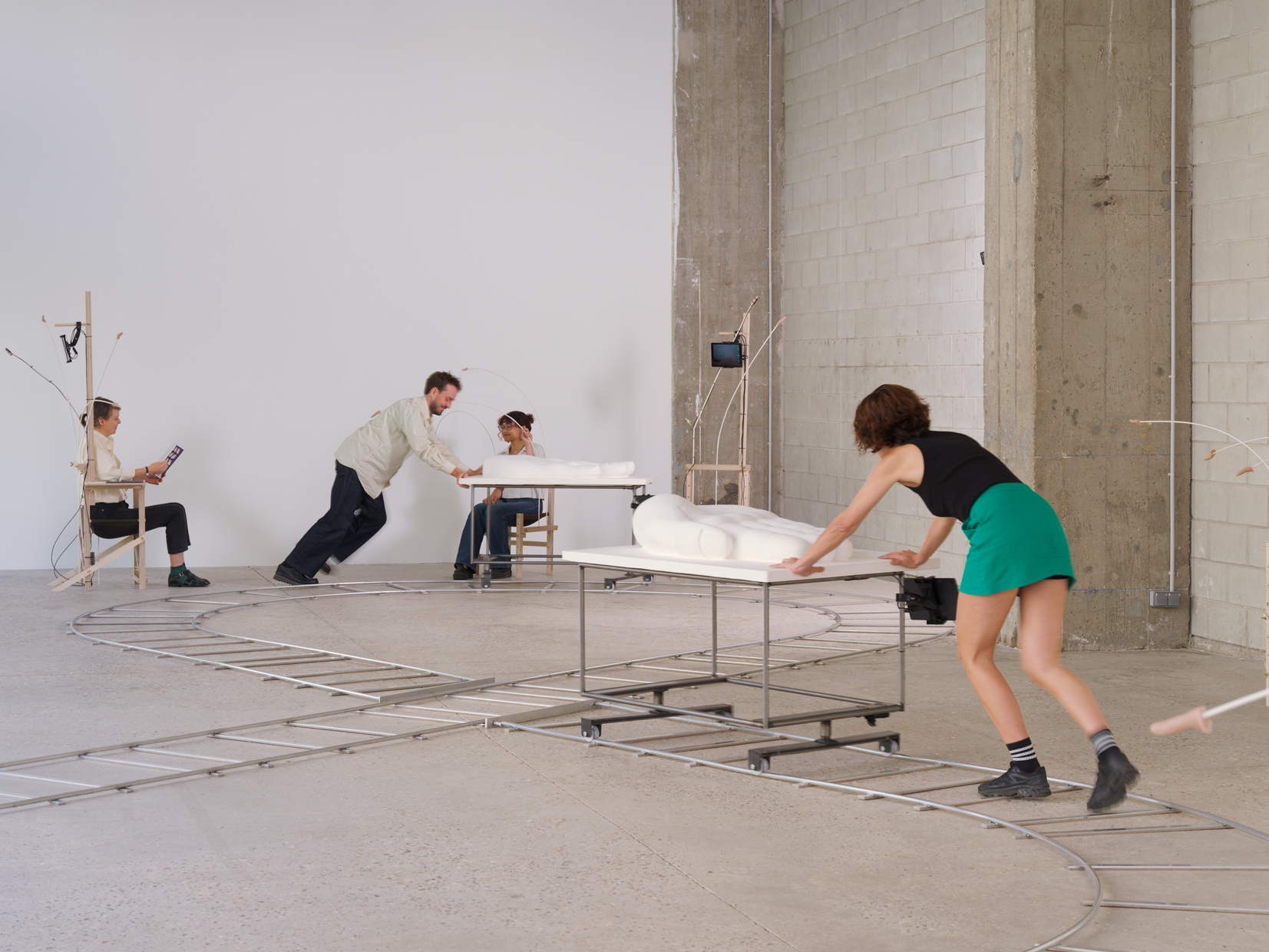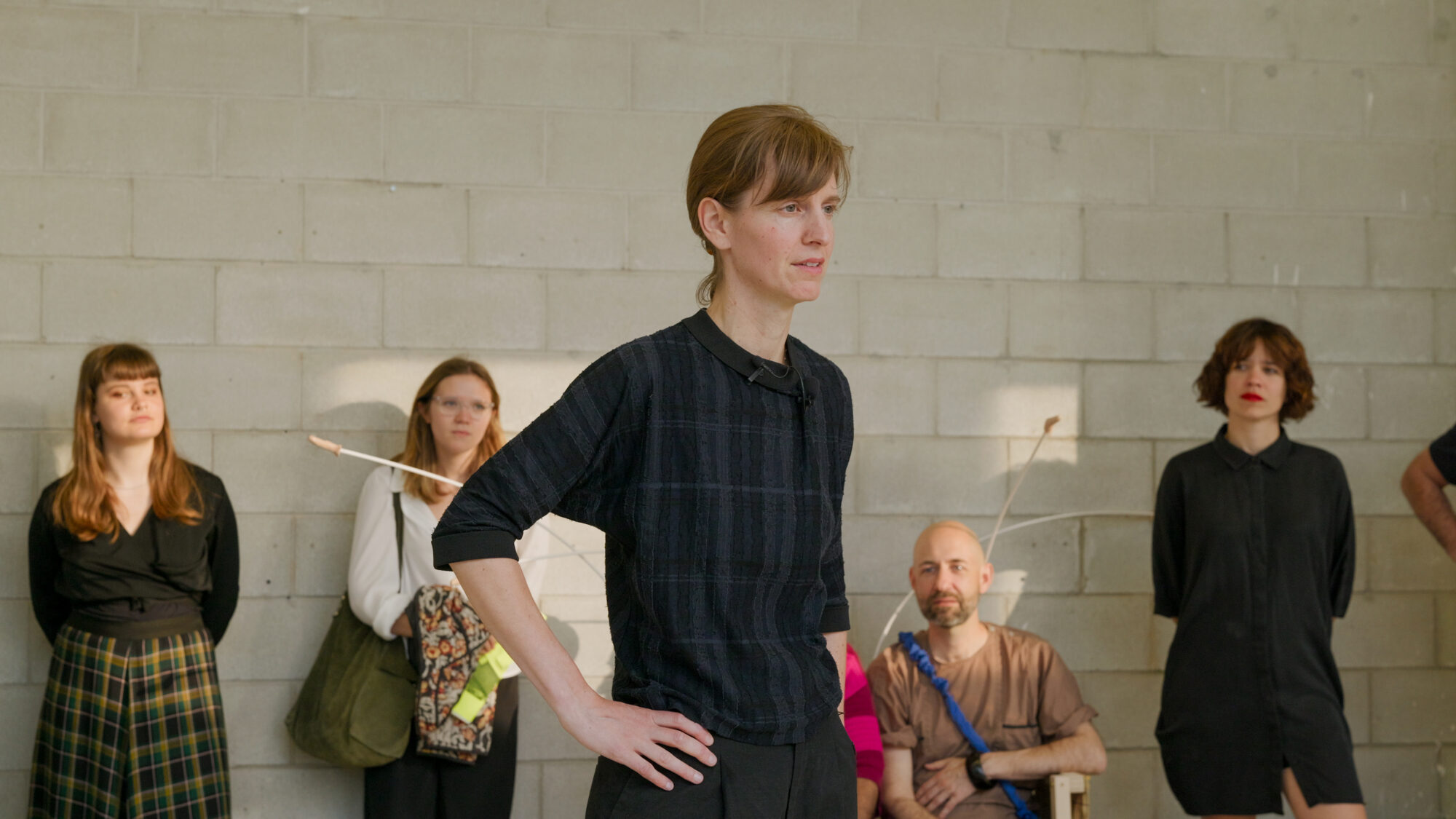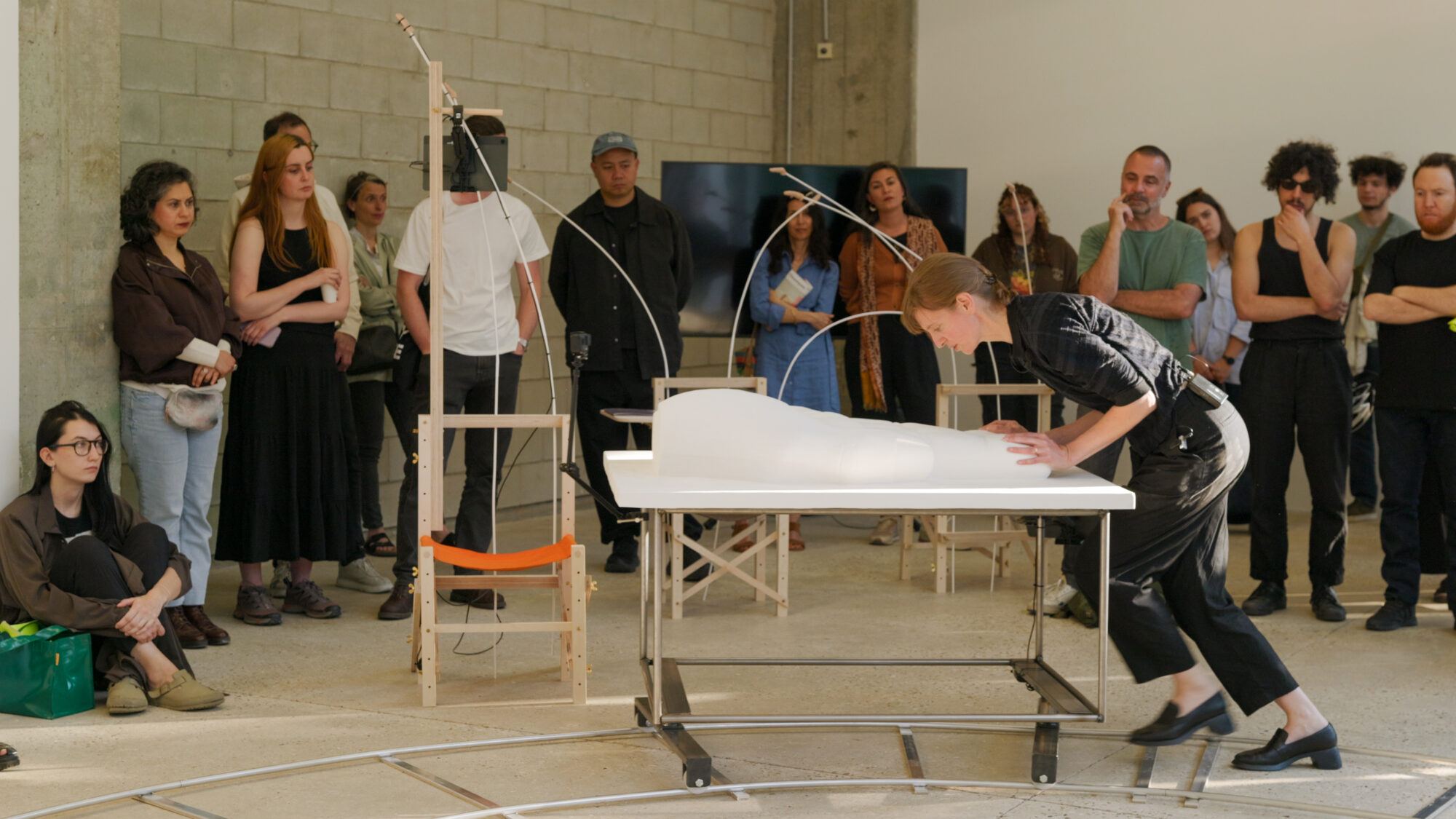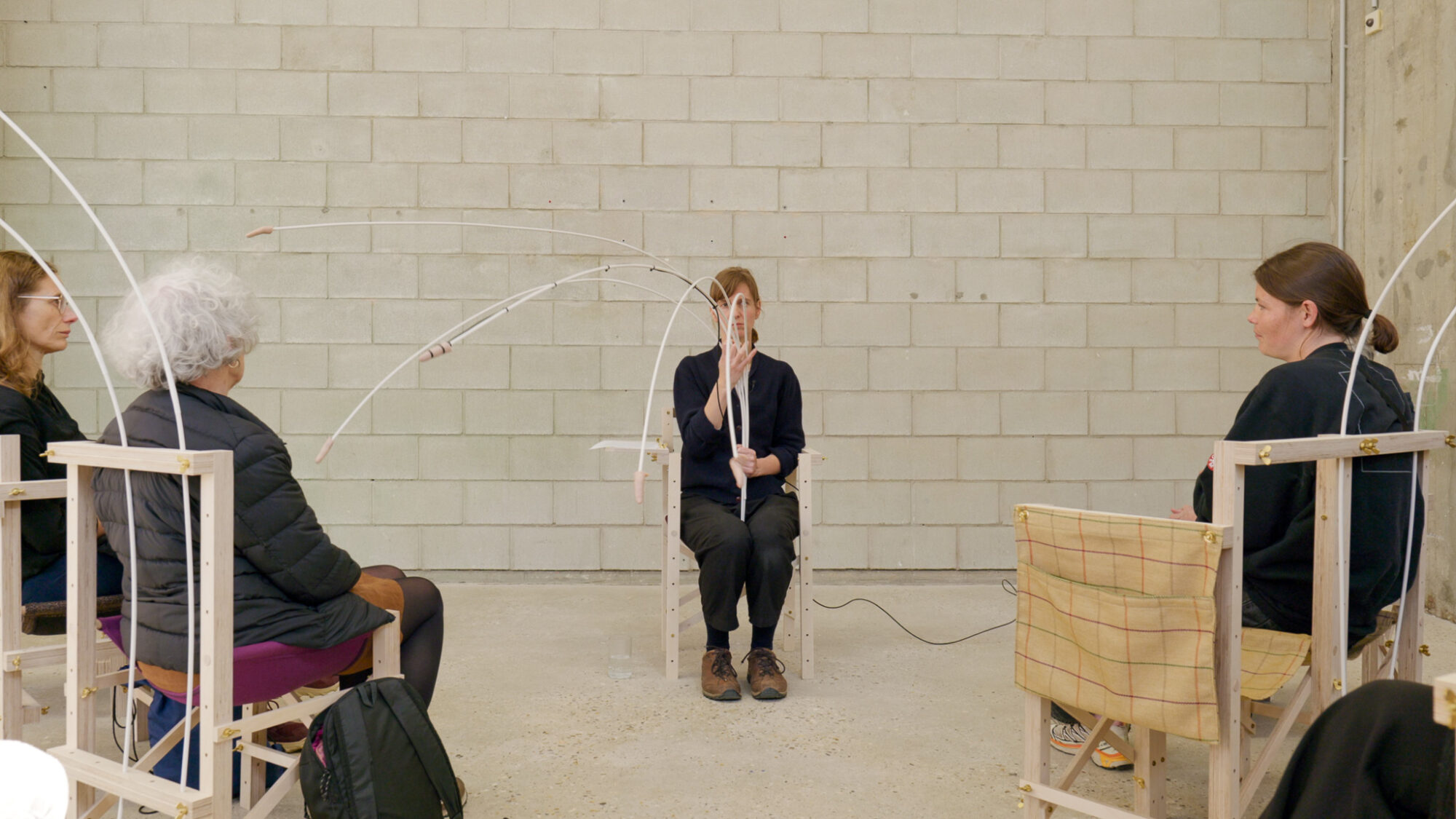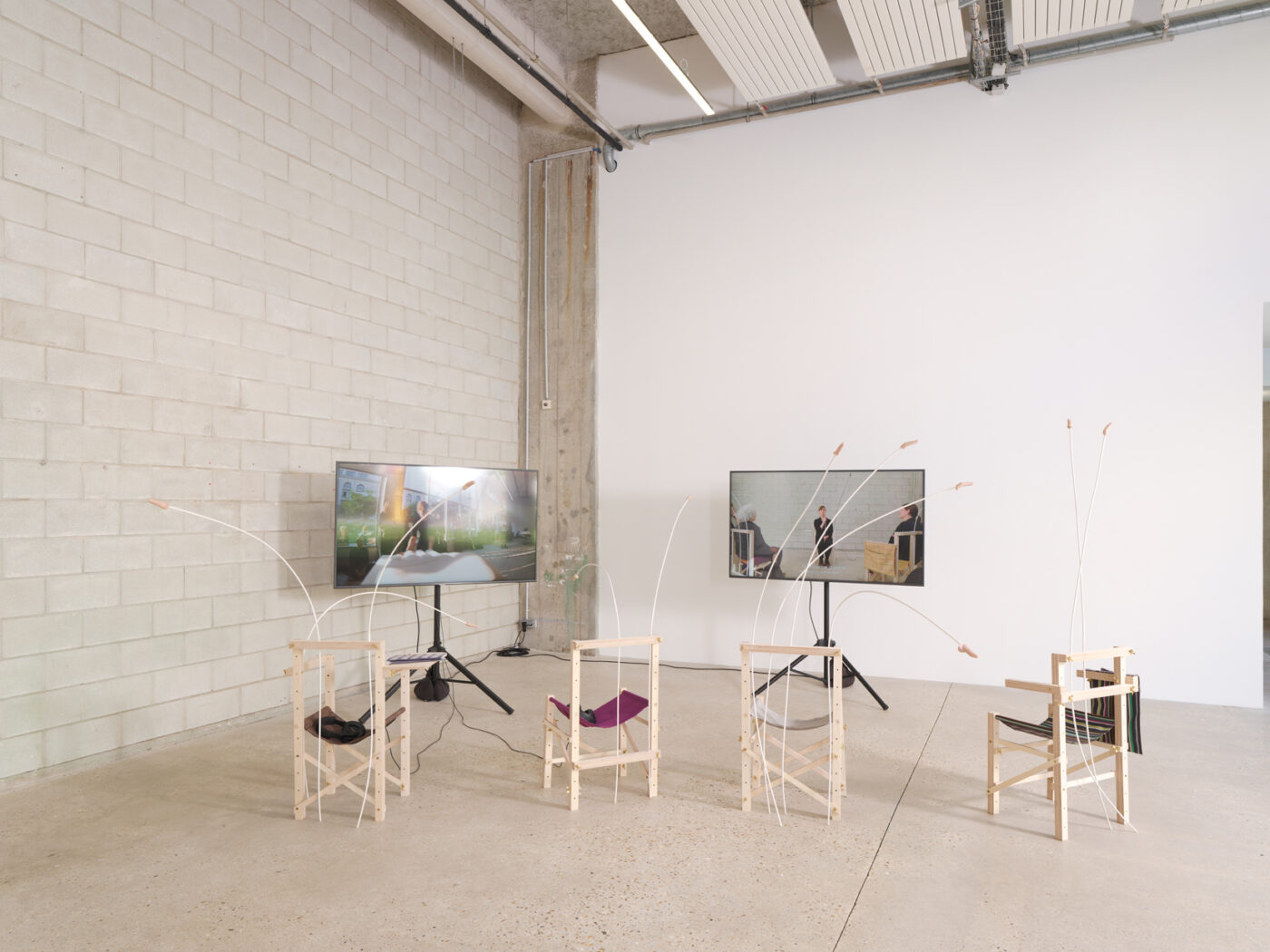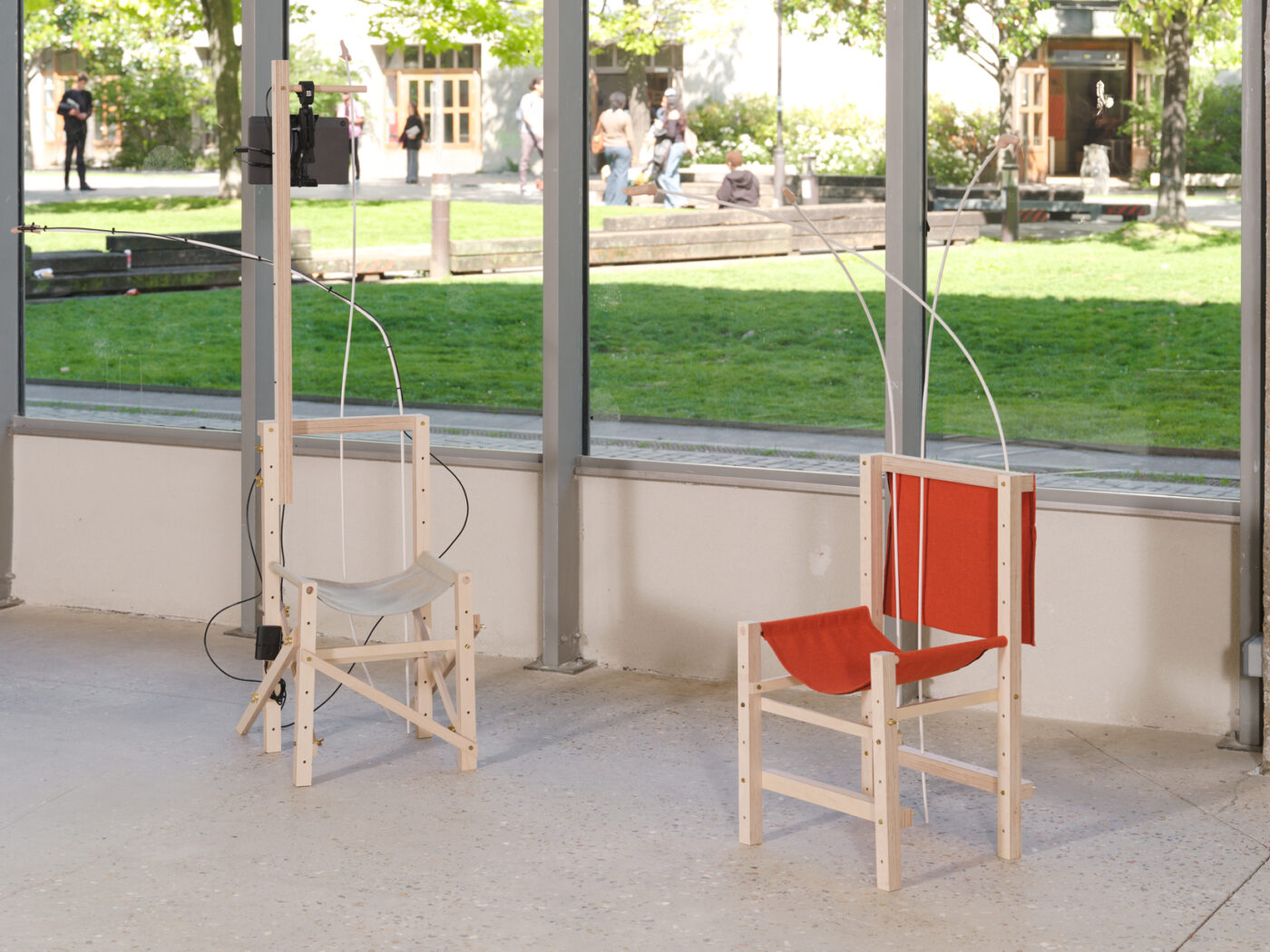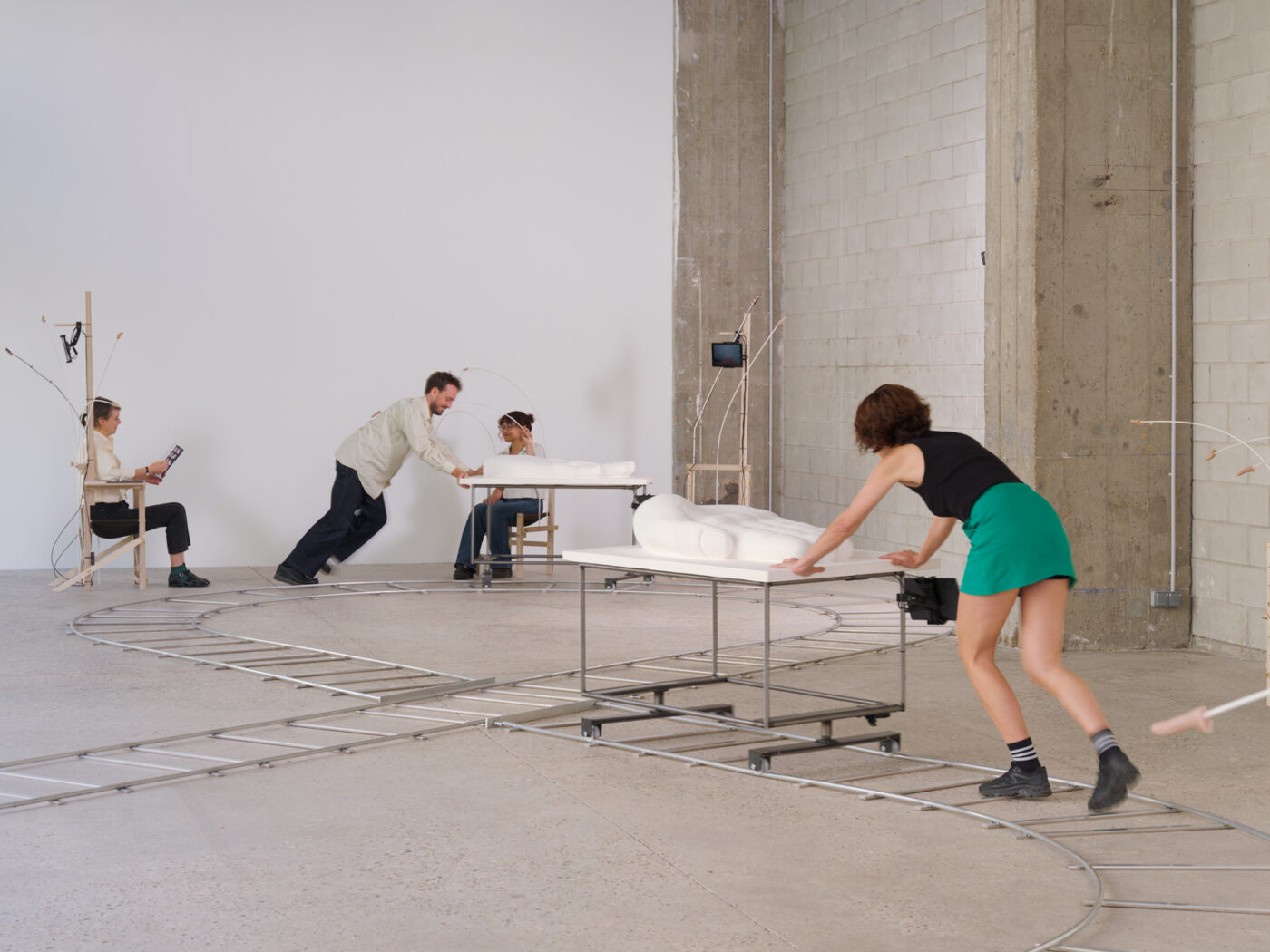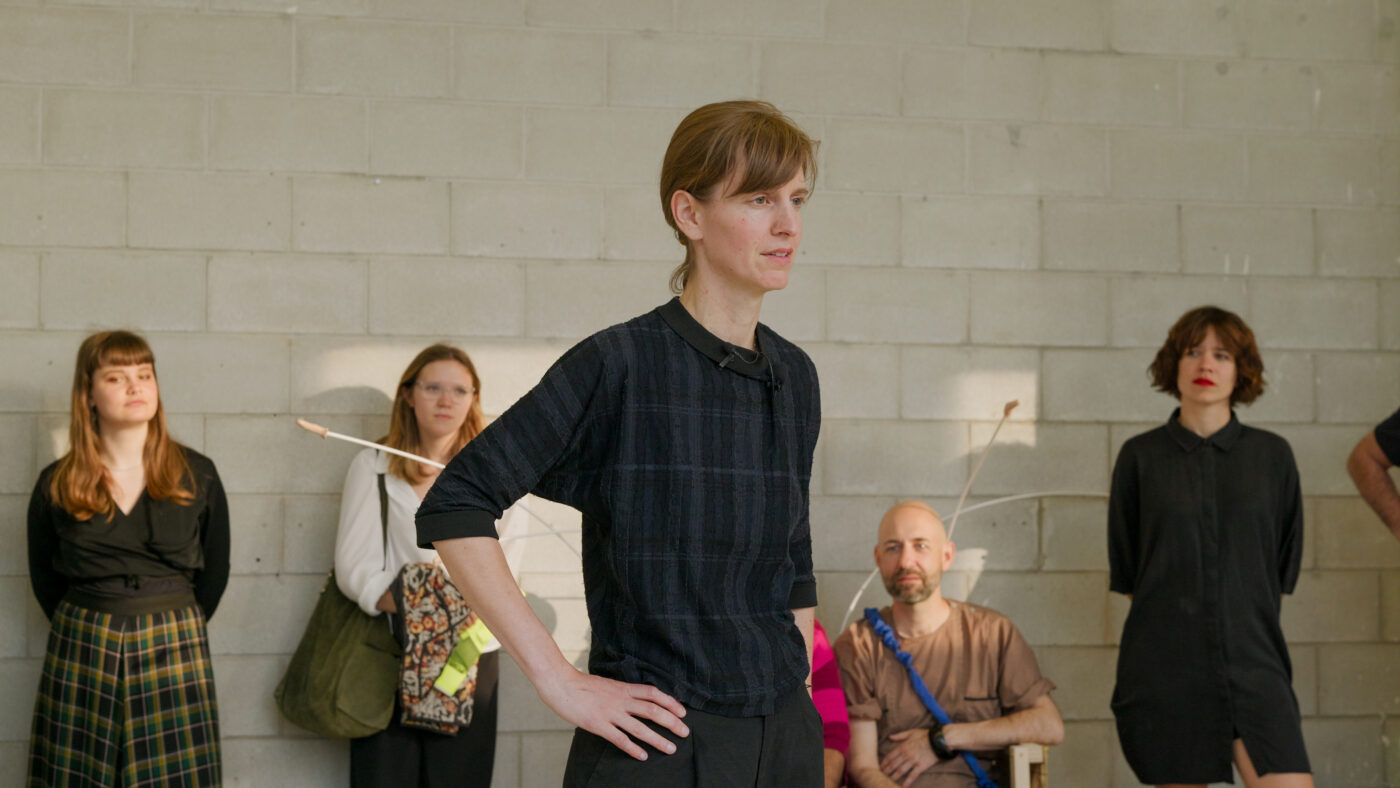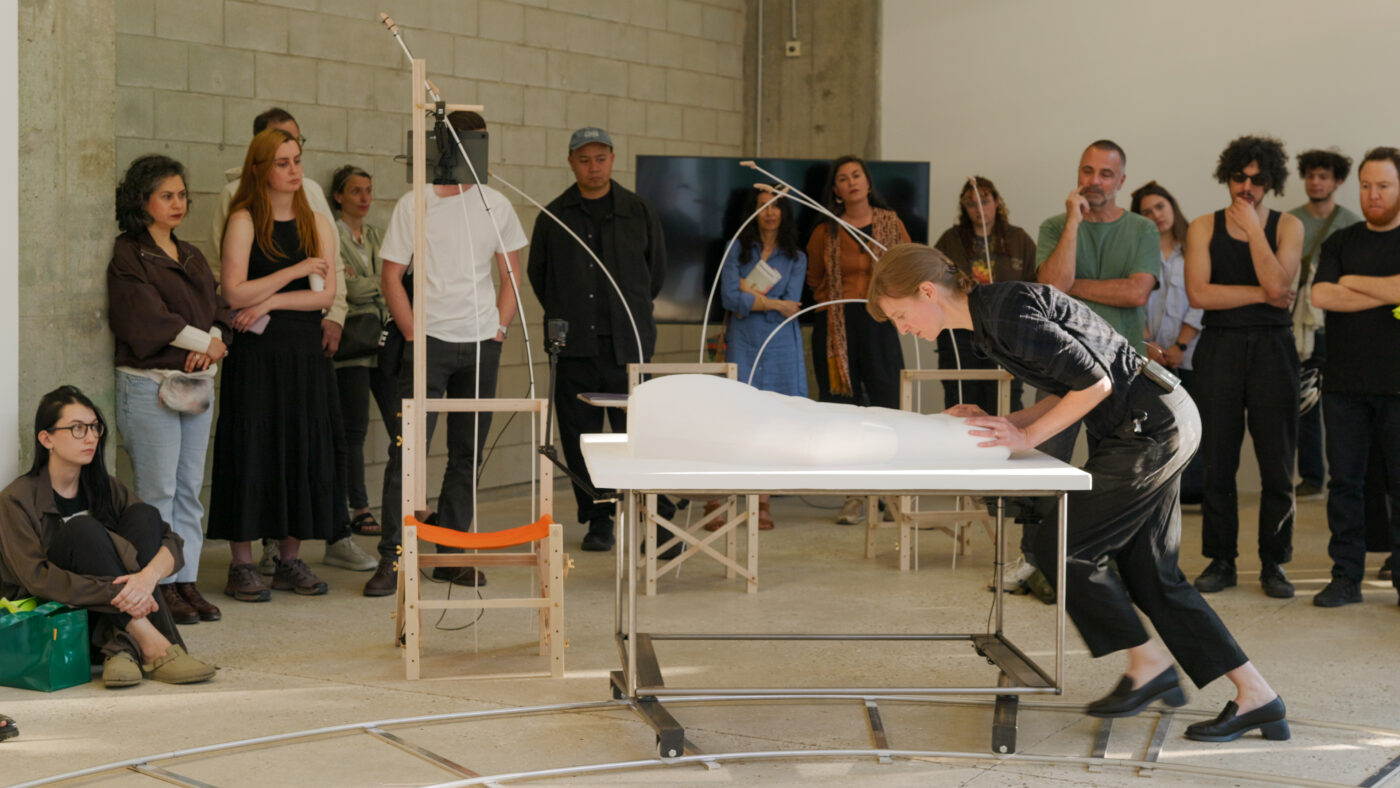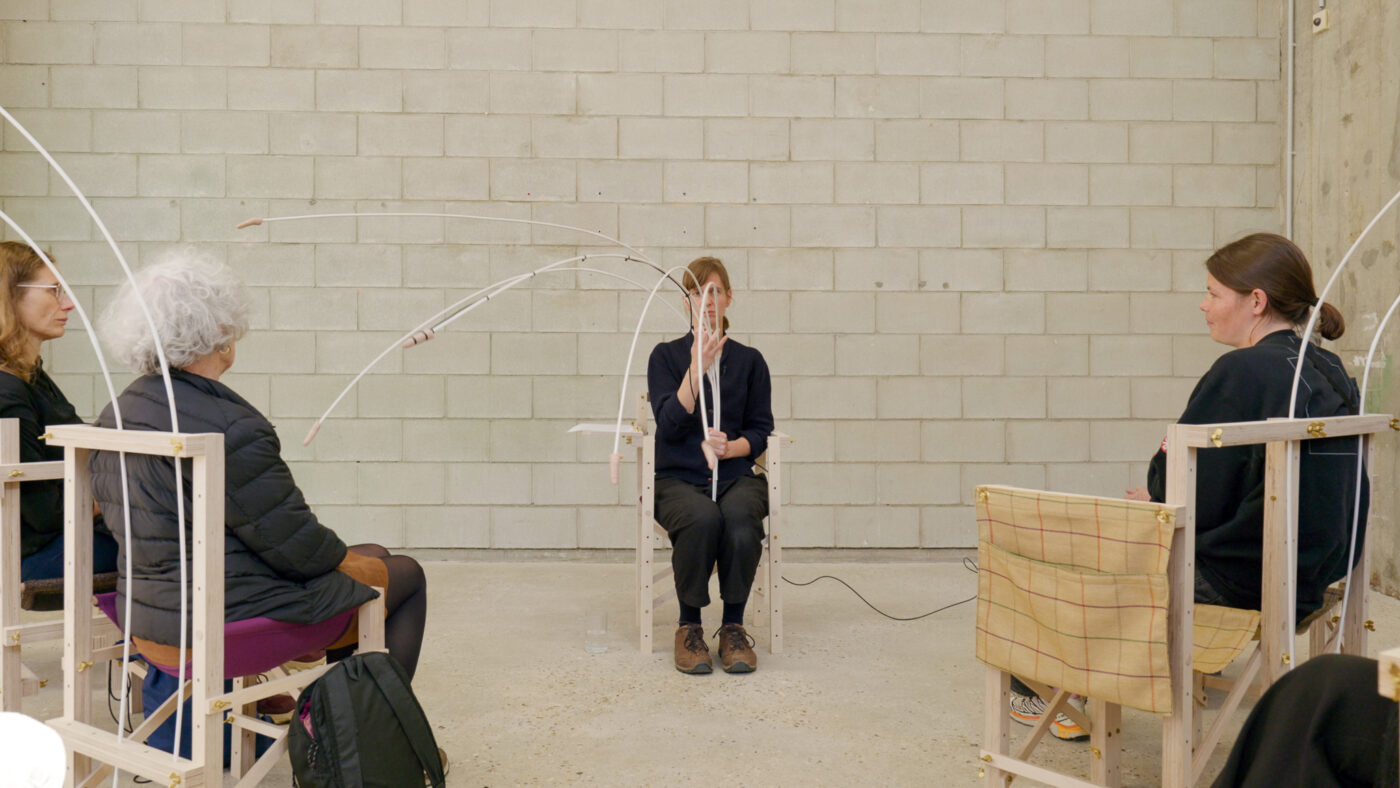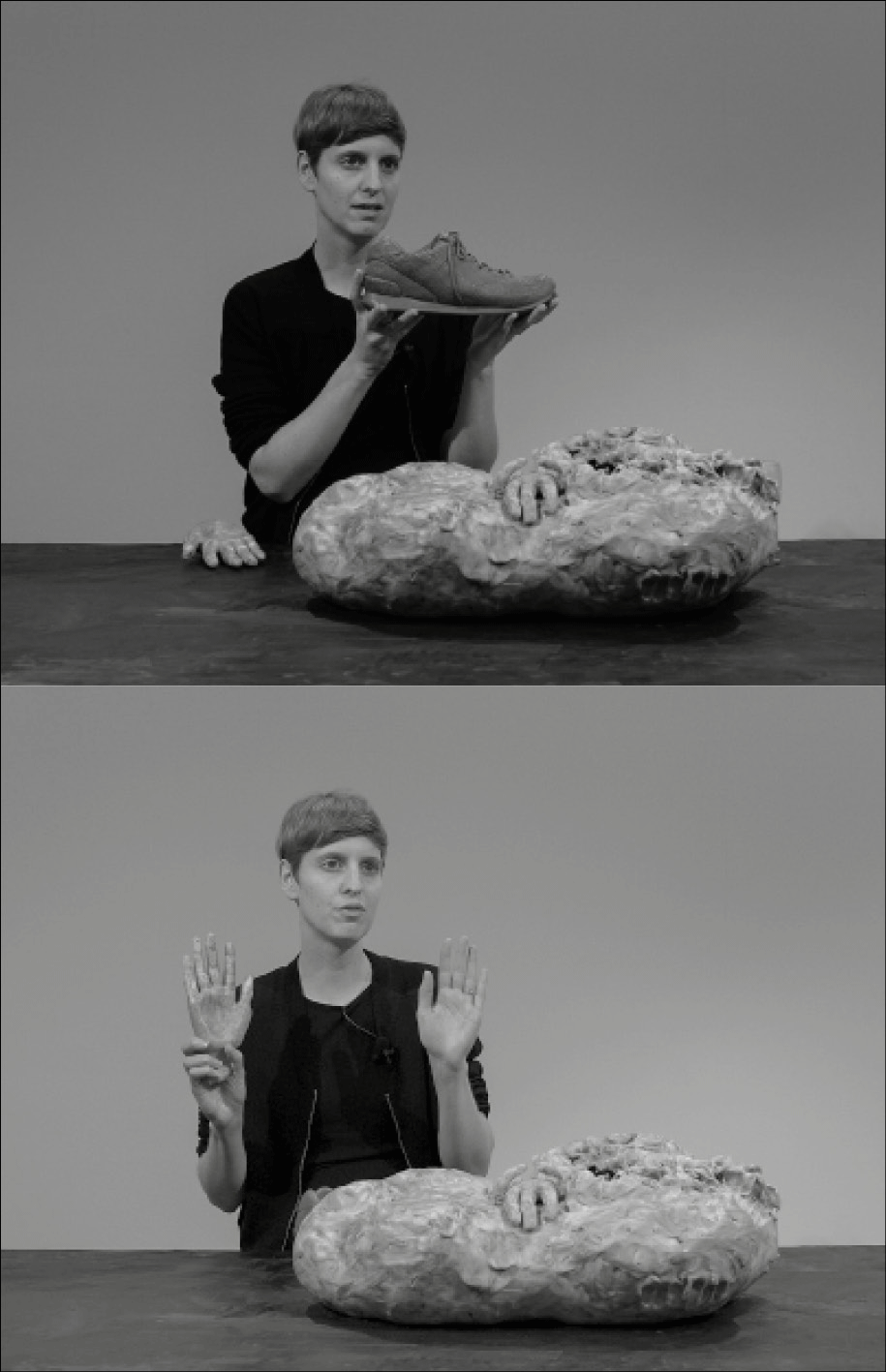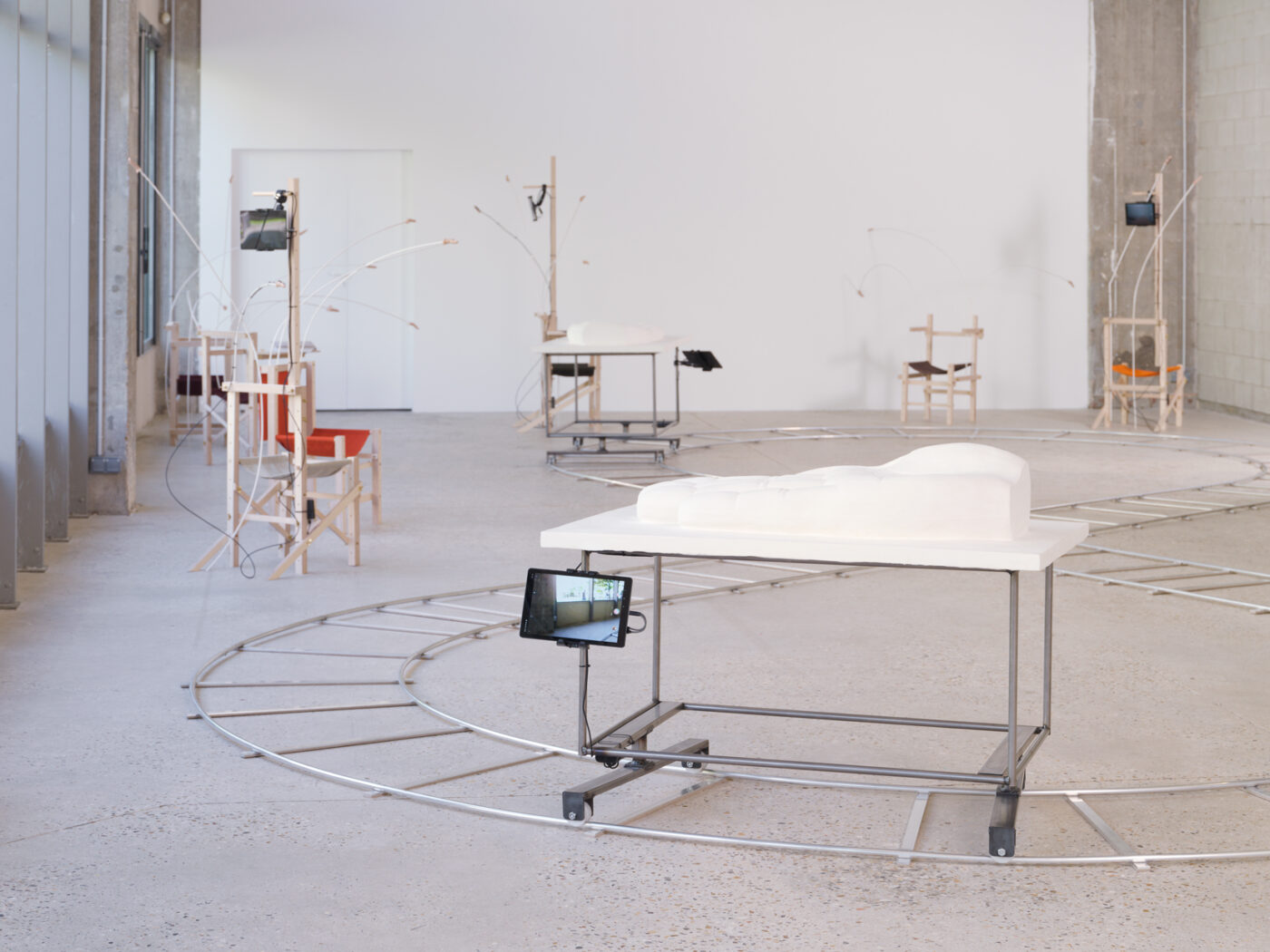
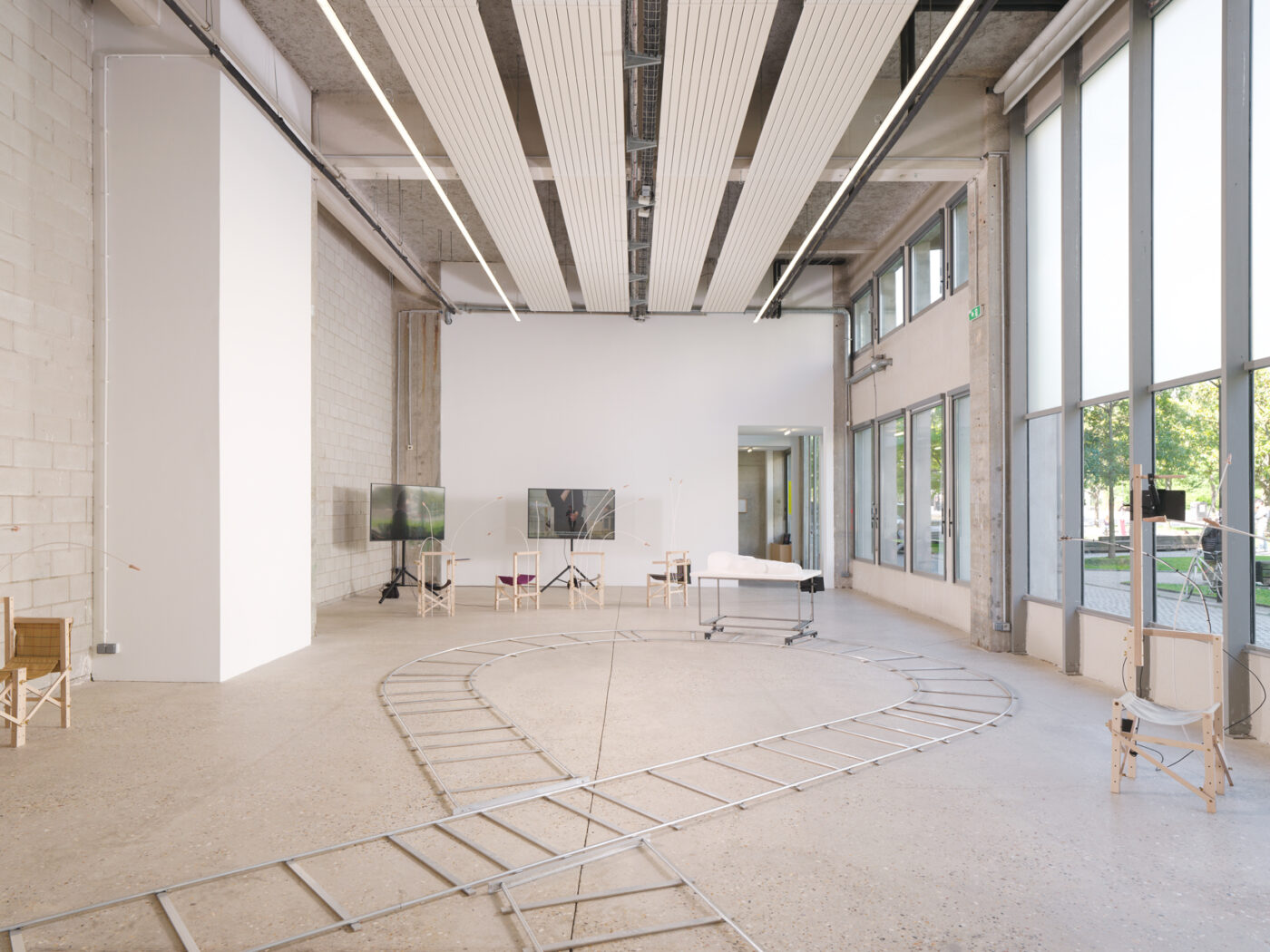
The Untamable Hand
Hedwig Houben
For the past fifteen years, Hedwig Houben has been reflecting on production in a dialogue that initially involves two protagonists: the figure of the artist and the sculptures she produces. This dialogue between an omniscient narrator or unwilling spokesperson of the identities she creates has often taken the form of a lecture-performance, recorded and then broadcast on site alongside sculptures, in an exhibition. Using manipulable forms in plasticine or plaster, she has created a vast gallery of characters endowed with transitional identities. Occasionally, the artist allows others – family, students, institutional staff, collectors – to play the role of guide-interpreters of her work, offering their expert perspectives as people involved in the various processes of making, transforming, mediating or maintaining her works.
As is often the case with Houben, this exhibition at Bétonsalon originates from a real-life experience that is interwoven with other accounts of similar situations and the concepts they convey. It all began with the artist’s hand suddenly shaking uncontrollably during a public speech. From this patent dysfunction, Houben draws several consequences, notably the representation of an independence of the members of her body from her own will, the manifestation of an open conflict. She also notices how reflexes, emotions and gestures are much faster than any articulated language and outpace it. From this physiological experience and inverted rhythm, Hedwig Houben draws a broader reflection on the agentivity of a hand that does not obey the subject’s intentions, places them in an uncomfortable situation. Frees itself from any injunction to be productive, the Hand prefers instead improvisation and rambling. Beyond the discomfort generated by this loss of control, this situation raises the question of the real or presumed vulnerability of the unity of a self, manifesting a split through the simple resistance of a body part who no longer conforms either to the expectations of a subject or to the social conventions.
Although the Hand is a recurring character in Hedwig Houben’s performances, here it acquires a new independence: it acts first as an entity with a dual personality, whose duality is highlighted by the impossibility of superimposing the right and left hands. In massive, stable forms, two outstretched hands oppose each other: one palmar, open, hollow and helpful, collects and distributes; the other dorsal, also flat but full, is available to no one. What she calls the ‘Pleasant hand’ and the ‘Ureliable hand’ are two sides of the same hand, the right. While coordination between the two hands is generally a sign of good cooperation, Hedwig Houben likes to undo any directive body schema to imagine their conflicts, with one seeking to gain the upper hand over the other, and the other ignoring the first. In this scenario, left-handedness is a guarantee of emancipation from the cultural habitus that hinders their agentivity, leading her towards a form of regressive idleness, a salvific surrender. Elsewhere, the Hand is broken down into several protruding fingers, fixed on extra-flexible rods and equipped with cameras that can be manipulated to point and film from a non- optical point of view. With this visual device live streaming disordered interactions of images, Hedwig Houben seeks to decentre herself from the narrative scheme generated by the perspective of a single person, preferring instead the visual cacophony of an incomplete, unprogrammed, spontaneous multitude.
The issues of interdependence that run through this exhibition are questions that Hedwig Houben addresses to herself and, more broadly, to her status as an artist and polyactive worker, but also to her dependence on and attempts at autonomy from the art world, a world that, moreover, knows how to plead collective causes while perpetuating the atomization of authorship within its own organizational structures. Without seeking to theoretically resolve these dilemmas common to many artists, the primary purpose of this exhibition would be to collectively formulate these questions, to find public forms that can be shared, and to engage with them in their most unresolved aspects.
Hedwig Houben
Hedwig Houben (1983) is a Dutch artist who lives and works in Brussels. She creates filmed perfromances in which she explores the relationship between subjects and objects and the role the latter play in shaping our identity. Using malleable plasticine sculptures that she makes and unmakes, she engages in a dialogue with these constantly evolving creations or with herself in a controlled flow of words, thwarting the codes and expectations of conferences and official speeches.
Her work has been presented in numerous exhibitions and festivals such as: ‘SWEEP, TAP, SWOOOOOP’ at MHKA, Antwerp (2019), ‘You and I’ at Spike Island, Bristol (2016), ‘UnScene’, at Wiels, Brussels (2015), ‘Don’t You Know Who I Am? Art After Identity Politics’, MHKA, Antwerp (2014), “Six Possibilities for a Sculpture”, La Loge, Brussels (2013). With Émilie Renard, she has participated in four group shows: ‘Le corps fait grève’ at Bétonsalon (2021), ‘Tes mains dans mes chaussures’ (2016-2017, co-curator Vanessa Desclaux) and ‘La langue de ma bouche’ (in duo with Jean-Charles de Quillacq, 2018) at La Galerie, centre d’art contemporain, Noisy-le-Sec and ‘The Bridegroom Suites’ (co-cur. Hugues Decointet, with the Guy de Cointet Society) during Performance Day at the Centre d’art de la Ferme du Buisson, Noisiel (2019).
From 2015 to 2023, she was professor at the Art and Research Department of the St. Joost School of Art and Design in Breda (Netherlands), which she recently left, just as she left her gallery in 2020. Since 2019, she has joined forces with Rob Leijdekkers and Brenda Tempelaar to reflect on the conditions of artistic production based on collective experiences. Today, alongside her artistic practice, she restores furniture.
This exhibition is supported by the Mondriaan Fonds, the Embassy of Netherlands in Paris and CARADT – Centre of Applied Research for Art, Design and Technology in the Netherlands.
“Hand Hand Polish” performance at 7 pm
Self-portrait & short films workshop — for families and children aged 6 and over
A look back at the history of Bétonsalon around the exhibition “La Moitié des Choses” (2010) with some of the artists who participated.
Writing and zine-making workshop, for adults, part of the Treize’Estival.
Bionic hand workshop, for children aged 5 and over, part of the Treize’Estival.
Collective reading
Writing and zine-making workshop, for families and children
Performances by Nicole, Lisa Lecuivre, Estelle Benazet Heugenhauser, Helena de Laurens, Star Finch & cl✰ra.
Aluminum rails
Video of a performance filmed by Bas Schevers at Bétonsalon, May 7, 2025, 14 min.
PVC tubes, silicone, endoscopic cameras
Series of 12 wooden chairs, touchscreens tablet, textiles
